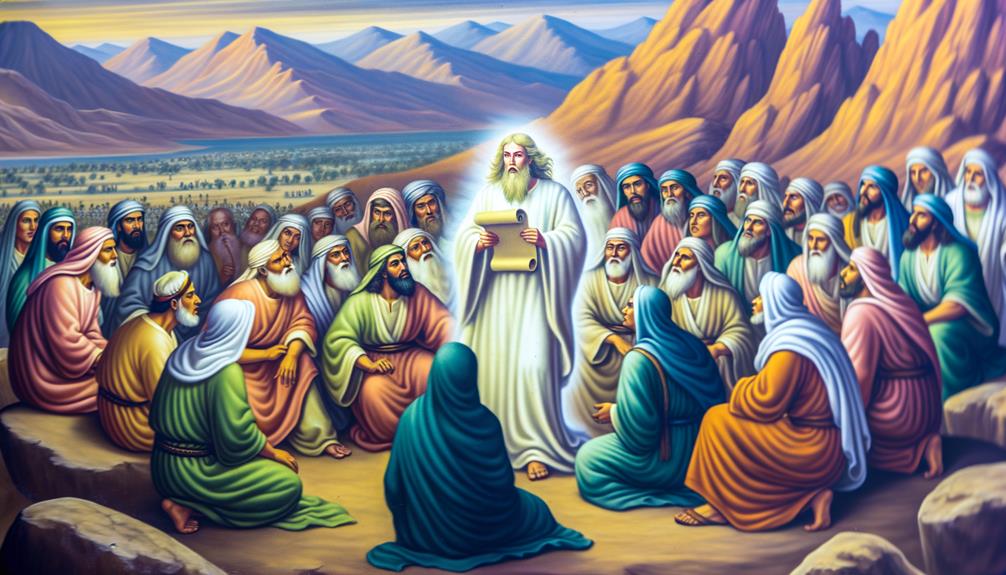What Is the Meaning of Prophecy According to the Bible
According to the Bible, prophecy signifies divinely inspired declarations, rooted in the Hebrew ‘nabi’ and the Greek ‘prophetes.’ It involves foretelling future events, offering divine guidance, and calling for repentance. Historically, prophecy is intertwined with ancient socio-political and religious contexts, featuring figures like Moses and Isaiah.
Prophets serve as intermediaries, conveying God’s will through visions, dreams, and auditory revelations. Types of prophetic messages include foretelling future events, forthtelling current spiritual states, and providing guidance.
To grasp the full scope of biblical prophecy, including its impact and fulfillment, requires exploring both covenants and the lives of key prophetic figures.

Meaning of Prophecy According to the Bible: Divine Revelation, Guidance, and Fulfillment
| Biblical Theme | Meaning of Prophecy in Scripture |
|---|---|
| Divine Revelation | Prophecy is God revealing His will, plans, or truth through chosen individuals (Amos 3:7). |
| Guidance and Warning | Often serves to correct, warn, or guide God’s people back to righteousness (Jeremiah 25:4-5). |
| Foretelling and Fulfillment | Includes prediction of future events, many fulfilled in the life of Jesus (Isaiah 53). |
| Empowered by the Holy Spirit | True prophecy comes through the Spirit, not human insight (2 Peter 1:21). |
| Christ-Centered Purpose | All prophecy ultimately points to Jesus and God’s redemptive plan (Revelation 19:10). |
Definition of Biblical Prophecy

Biblical prophecy, rooted in the Hebrew term ‘nabi’ and the Greek term ‘prophetes,’ fundamentally refers to the divinely inspired declarations and revelations imparted by God to His chosen messengers.
These revelations, often delivered through visions, dreams, or direct verbal communication, serve multiple functions such as foretelling future events, providing divine guidance, or calling for repentance.
Theologically, prophecy is not merely predictive but also forthtelling, addressing the current spiritual and moral state of the audience.
Contextually, prophetic messages are deeply interwoven with the socio-political and religious landscapes of their times.
Scripturally, these messages are preserved in texts like Isaiah, Jeremiah, and Revelation, each offering a unique lens through which the divine will and purpose are articulated and understood.
Origins of Prophecy in the Bible

Exploring the origins of prophecy in the Bible necessitates examining ancient prophetic figures such as Moses, Samuel, and Elijah, who served as intermediaries between God and humanity.
The methods of divine communication, ranging from visions and dreams to direct verbal revelations, highlight the varied ways through which God imparted His messages.
Understanding these historical contexts enables a thorough analysis of how prophecy functioned within the biblical narrative and its theological implications.
It highlights the interplay between divine revelation and human experience, revealing how ancient communities interpreted their circumstances through prophetic messages.
Additionally, by examining the specific cultural and sociopolitical factors at play, we can better comprehend how individuals and groups tread meaning in biblical context, shaping their beliefs and actions in response to prophetic teachings.
Ultimately, this understanding enriches our appreciation of the complexities within the Scripture and its lasting impact on faith traditions.
Ancient Prophetic Figures
The origins of prophecy in the Bible can be traced back to ancient figures such as Abraham, Moses, and Samuel, whose roles as intermediaries between God and His people set the foundation for the prophetic tradition.
These early prophets communicated divine will, offered guidance, and foretold events, thereby establishing a lineage of spiritual leadership.
| Biblical Figure | Role in Prophetic Tradition |
|---|---|
| Abraham | Covenant and Blessing |
| Moses | Lawgiver and Deliverer |
| Samuel | Judge and Prophet |
| Elijah | Opposer of Idolatry |
| Isaiah | Major Prophet of Judah |
Their contributions are foundational, as they not only conveyed divine messages but also modeled obedience, faith, and moral integrity, which are central to understanding biblical prophecy.
Divine Communication Methods
Understanding how these early prophetic figures received and conveyed divine messages requires an examination of the various methods of divine communication described in the Bible. These methods encompass direct visions, dreams, angelic visitations, and auditory revelations.
For instance, God’s communication with Moses through the burning bush (Exodus 3:2-4) exemplifies a direct encounter, while Joseph’s prophetic dreams (Genesis 37:5-10) highlight divine messaging through dreams.
The Book of Daniel elaborates on angelic intermediaries, such as Gabriel (Daniel 8:16), delivering divine insights.
Furthermore, the auditory revelation as experienced by Samuel (1 Samuel 3:4-10) demonstrates God’s voice calling directly.
Each method underscores the diverse ways God imparted His will and guidance, enriching the theological understanding of prophecy within biblical tradition.
Historical Prophecy Contexts
Amidst ancient Israelite society, the origins of prophecy in the Bible can be traced to the patriarchal era, where figures like Abraham and Moses first emerged as conduits of divine revelation.
These early patriarchs set the precedent for a lineage of prophets who conveyed God’s will to His people. Understanding the historical contexts of these prophetic messages is essential for a nuanced interpretation of their significance within the biblical narrative.
| Prophet | Era | Key Scripture Reference |
|---|---|---|
| Abraham | Patriarchal Period | Genesis 12:1-3 |
| Moses | Exodus Period | Exodus 3:1-10 |
| Samuel | Early Monarchy | 1 Samuel 3:1-21 |
| Isaiah | Divided Kingdom | Isaiah 6:1-13 |
This table illustrates the pivotal roles of these prophets, encapsulating their historical contexts and scriptural foundations.
Role of Prophets

Within the biblical narrative, prophets serve as divine intermediaries, conveying God’s messages to His people and guiding them through periods of moral and spiritual crisis.
Their role encompasses calling individuals and nations to repentance, forewarning of impending judgment, and providing hope through promises of redemption and restoration.
Prophets like Isaiah, Jeremiah, and Ezekiel exemplify this, as their ministries addressed the spiritual waywardness of Israel and Judah.
Scripturally, prophets were often endowed with visions and inspired speech, evidenced in texts such as Amos 3:7, which states, ‘Surely the Sovereign LORD does nothing without revealing his plan to his servants the prophets.’
Historically, prophets also played pivotal roles in anointing kings and advising rulers, thereby shaping the spiritual and political landscape of ancient Israel.
Types of Prophetic Messages

Prophetic messages in the Bible can be broadly categorized into foretelling future events, forth-telling God’s will for the present, and offering divine guidance and warnings.
Foretelling involves predicting future occurrences, as seen with the Messianic prophecies in Isaiah. Forth-telling relates to proclaiming God’s directives for contemporary situations, exemplified by Jeremiah’s calls for repentance.
Finally, divine guidance and warnings often provide immediate counsel or caution, like Nathan’s rebuke to King David.
| Category | Description | Example |
|---|---|---|
| Foretelling | Predicting future events | Messianic prophecies (Isaiah) |
| Forth-telling | Proclaiming God’s will | Jeremiah’s calls for repentance |
| Guidance/Warnings | Offering counsel or caution | Nathan’s rebuke to David |
These categories encapsulate the multifaceted nature of biblical prophecy.
Prophecy in the Old Testament

Prophecy in the Old Scriptures encompasses the profound messages of the Major Prophets, whose revelations were pivotal for Israel’s spiritual and social transformation.
These prophetic declarations also include seminal Messianic prophecies that Christians believe were ultimately fulfilled in the life and ministry of Jesus Christ.
Major Prophets’ Messages
The messages conveyed by the Major Prophets in the Old Scriptures, particularly Isaiah, Jeremiah, Ezekiel, and Daniel, reveal profound insights into God’s covenant relationship with His people, divine judgment, redemption, and the eschatological hope for a restored Israel.
Isaiah’s prophecies emphasize God’s holiness and the promise of a future king from David’s line.
Jeremiah focuses on the themes of repentance and impending judgment, while also prophesying a new covenant.
Ezekiel provides vivid imagery of divine glory and the restoration of Israel through repentance.
Daniel’s visions, rich in apocalyptic symbolism, foretell the rise and fall of empires, ultimately pointing to God’s eternal kingdom.
Collectively, these prophets articulate a thorough view of divine justice and mercy.
Messianic Prophecies Fulfilled
While examining the Old Scriptures, one can discern numerous Messianic prophecies that Christians believe were fulfilled in the life and ministry of Jesus Christ.
These prophecies are deeply rooted in the theological and historical context of ancient Israel, illuminating the anticipation of a Messiah. Scriptural analysis reveals specific fulfillments:
| Prophecy | Old Covenant Reference | New Testament Fulfillment |
|---|---|---|
| Born of a Virgin | Isaiah 7:14 | Matthew 1:22-23 |
| Born in Bethlehem | Micah 5:2 | Matthew 2:1 |
| Betrayed for 30 Silver | Zechariah 11:12-13 | Matthew 26:14-16 |
| Crucifixion Details | Psalm 22 | John 19:23-24 |
This alignment underscores the continuity and divine orchestration perceived by believers through scriptural prophecy and its realization in Christ.
Prophecy in the New Testament

In the New Covenant, the role of prophecy is intricately linked to the advent and mission of Jesus Christ, serving as both a confirmation of Old Covenant prophecies and a revelation of future divine plans.
The New Scriptures document numerous instances where Jesus fulfills Old Scriptures prophecies, such as Isaiah 53’s Suffering Servant. Additionally, prophetic utterances in books like Revelation disclose eschatological visions, indicating God’s ultimate plans for humanity’s culmination.
Acts and the Epistles further highlight the Holy Spirit‘s role in inspiring prophetic gifts within the early Church, as seen in Acts 2:17-18, where Peter cites Joel’s prophecy about the outpouring of the Spirit.
Consequently, New Testament prophecy intertwines past, present, and future in divine continuity.
Impact of Prophecy on Believers

Rooted in both historical context and scriptural analysis, prophecy profoundly shapes the faith and spiritual lives of believers by providing divine guidance, reassurance, and a deeper understanding of God’s overarching plan.
Historically, prophetic messages have offered counsel during tumultuous times, strengthening the resolve of communities to remain steadfast in their faith.
Scripturally, prophecies, such as those found in Isaiah and Revelation, illuminate God’s intentions and promises, instilling hope and perseverance among the faithful.
In addition, the fulfillment of biblical prophecies serves as a demonstration of God’s sovereignty and reliability.
This divine affirmation not only fortifies individual belief but also fosters a communal sense of purpose and direction, aligning believers more closely with their spiritual calling and divine mission.
Conclusion
Biblical prophecy serves as a divine communication method, with origins deeply rooted in both the Old and New Scriptures.
Prophets played essential roles by delivering varied messages, from warnings to promises of salvation.
Significantly, approximately 27% of the Bible is composed of prophetic material, underscoring its importance in scriptural context and theological discourse.
This substantial proportion highlights prophecy’s profound impact on guiding and shaping the beliefs and actions of adherents throughout history.






